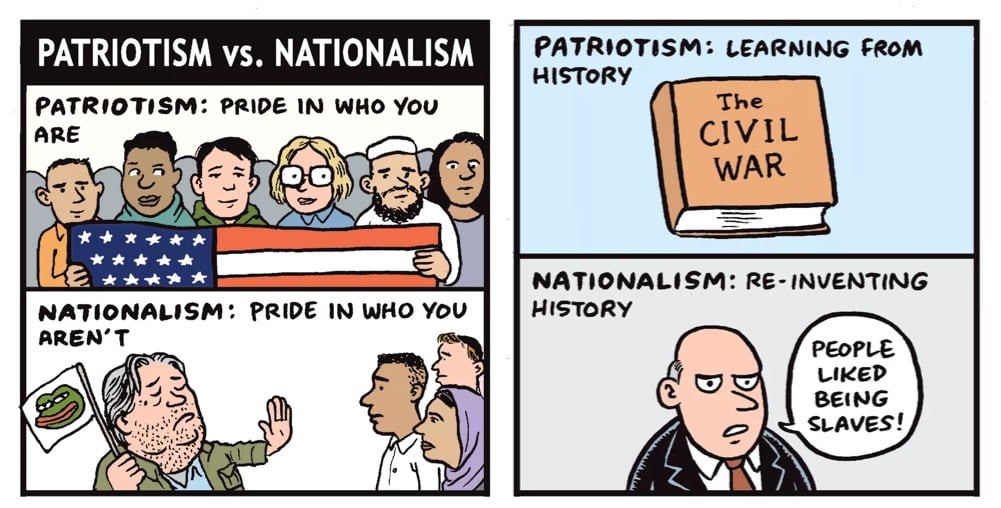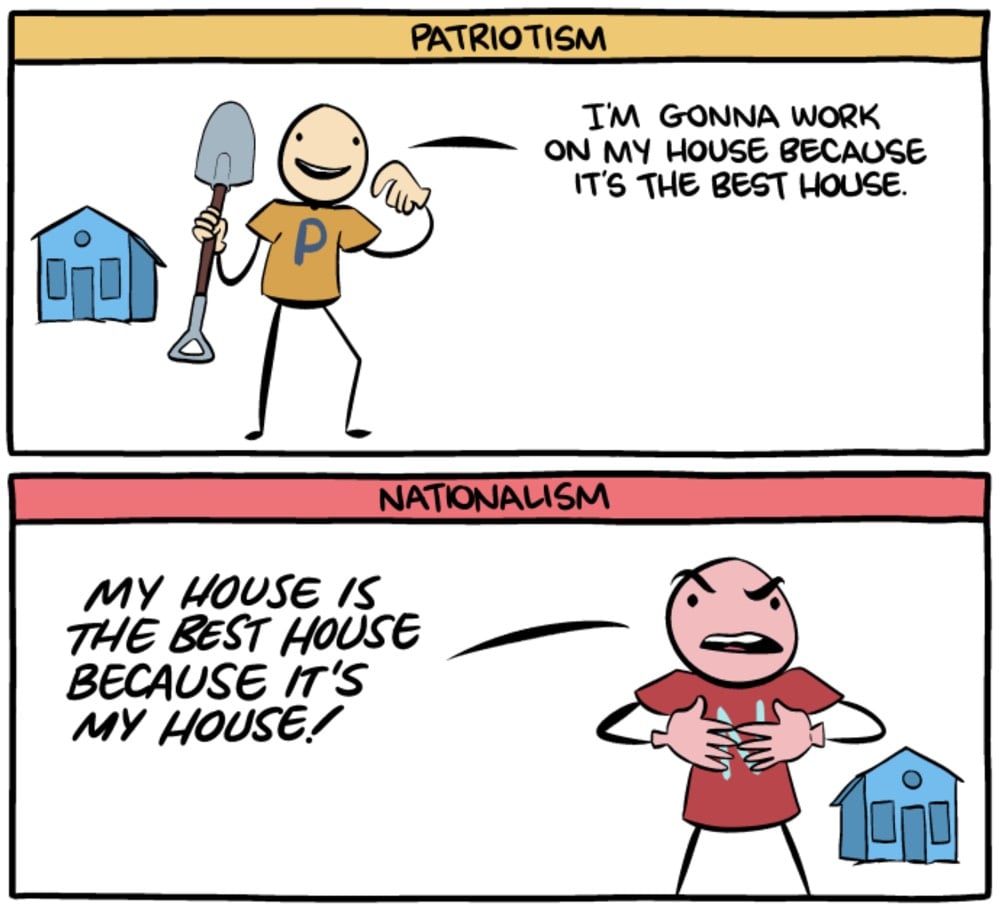Resegregation, Coups, Orwell, and the Importance of Precise Language
Karen Attiah wrote a short opinion piece about how the nationwide assault on diversity, equity and inclusion led by conservatives is actually aimed at resegregation and how being precise in our language about what’s happening is crucial.
These facts, taken together, point to the removal of Black people from academic, corporate and government spaces: resegregation.
People are vowing to push back with their wallets — to shop at Costco and boycott Target, for example. But I believe the fight starts with language. Journalists have a role and an obligation to be precise in naming what we are facing.
Frankly, I wish the media would stop using “DEI” and “diversity hiring” altogether. Any official, including the president, who chooses to blame everything from plane crashes to wildfires on non-White, non-male people should be asked whether they believe that desegregation is to blame. Whether they believe resegregation is the answer. We need to bring back the language that describes what is actually happening.
When I write about difficult or contentious topics where I want to take great care to not be misunderstood and to be as accurate as I can be, I always think about this piece by history professor Michael Todd Landis on the language we use to talk about the Civil War & slavery.
Specifically, let us drop the word “Union” when describing the United States side of the conflagration, as in “Union troops” versus “Confederate troops.” Instead of “Union,” we should say “United States.” By employing “Union” instead of “United States,” we are indirectly supporting the Confederate view of secession wherein the nation of the United States collapsed, having been built on a “sandy foundation” (according to rebel Vice President Alexander Stephens). In reality, however, the United States never ceased to exist. The Constitution continued to operate normally; elections were held; Congress, the presidency, and the courts functioned; diplomacy was conducted; taxes were collected; crimes were punished; etc. Yes, there was a massive, murderous rebellion in at least a dozen states, but that did not mean that the United States disappeared.
Landis notes that scholar Edward Baptist also uses different language:
In his 2014 book The Half Has Never Been Told: Slavery and the Making of American Capitalism (Basic Books), he rejects “plantations” (a term pregnant with false memory and romantic myths) in favor of “labor camps”; instead of “slave-owners” (which seems to legitimate and rationalize the ownership of human beings), he uses “enslavers.” Small changes with big implications. These far more accurate and appropriate terms serve his argument well, as he re-examines the role of unfree labor in the rise of the United States as an economic powerhouse and its place in the global economy. In order to tear down old myths, he eschews the old language.
German museums and public remembrances of the Holocaust use similarly precise language:
Just as important, the language they used on the displays in these places was clear and direct, at least in the English translations. It was almost never mealy-mouthed language like “this person died at Treblinka”…like they’d succumbed to natural causes or something. Instead it was “this person was murdered at Treblinka”, which is much stronger and explicitly places blame on the Nazis for these deaths.
This is why I’ve been so insistent on describing the events of January 6, 2021 as an attack on Congress and as a coup attempt:
This was not an attack on the Capitol Building. This was an attack on Congress, the United States Government, and elected members of our government. It was a coup attempt. Can you imagine what the mob in those videos would have done had they found Nancy Pelosi? Kidnapping or a hostage situation at the very least, assassination in the worst case. Saying that this was an “attack on the Capitol” is such an anodyne way of describing what happened on January 6th that it’s misleading. Words matter and we should use the correct ones when describing this consequential event.
In writing about the 2025 Coup, I’ve been careful to call it a coup because it is. I’ve been repeating words like “illegal” and “unconstitutional” because these actions attacks by Trump and Musk are just that. Our government’s computing systems have been “seized” or “broken into to” or “hacked” (illegal!) rather than “accessed” (sounds routine). In his piece yesterday, Jamelle Bouie argued for more precision in how we describe the coup:
To describe the current situation in the executive branch as merely a constitutional crisis is to understate the significance of what we’re experiencing. “Constitutional crisis” does not even begin to capture the radicalism of what is unfolding in the federal bureaucracy and of what Congress’s decision not to act may liquidate in terms of constitutional meaning.
One of the reason people get so upset at media like the NY Times and Washington Post is because the language they often use is so watered down that it’s actually not truthful. Take the initial opening paragraph to this NYT piece about Trump’s statement about wanting to ethnically cleanse Gaza:
President Trump declared on Tuesday that he would seek to permanently displace the entire Palestinian population of Gaza and take over the devastated seaside enclave as a U.S. territory, one of the most audacious ideas that any American leader has advanced in years.
(They later changed “audacious” to “brazen”.) Audacious? Brazen? Advanced? Ideas? These words all have meanings! And when you put them together, it makes Trump sound like some genius superhero statesman. And “seaside enclave”? That is technically correct but it sounds like they’re talking about fucking Montauk. This is terrible writing that fails to communicate the truth of the situation.
Here’s why this matters: imprecise and euphemistic language is the language of fascists, authoritarians, and oppressors — power-craving leaders who either don’t want people to know what they are doing or don’t want them to think too hard about the illegality or immorality of their actions. The Nazis had all kinds of euphemisms — the “Final Solution to the Jewish Question”, “protective custody”, “work-shy”, “enhanced interrogation” — to mask their mass imprisonment activities and mass murder.
In 1946, Nineteen Eighty-Four author George Orwell published an essay called Politics and the English Language in which he decried the “lack of precision” of political writing:
Each of these passages has faults of its own, but, quite apart from avoidable ugliness, two qualities are common to all of them. The first is staleness of imagery; the other is lack of precision. The writer either has a meaning and cannot express it, or he inadvertently says something else, or he is almost indifferent as to whether his words mean anything or not. This mixture of vagueness and sheer incompetence is the most marked characteristic of modern English prose, and especially of any kind of political writing. As soon as certain topics are raised, the concrete melts into the abstract and no one seems able to think of turns of speech that are not hackneyed: prose consists less and less of words chosen for the sake of their meaning, and more and more of phrases tacked together like the sections of a prefabricated hen-house.
And from his concluding paragraph:
…one ought to recognize that the present political chaos is connected with the decay of language, and that one can probably bring about some improvement by starting at the verbal end. If you simplify your English, you are freed from the worst follies of orthodoxy. You cannot speak any of the necessary dialects, and when you make a stupid remark its stupidity will be obvious, even to yourself. Political language — and with variations this is true of all political parties, from Conservatives to Anarchists — is designed to make lies sound truthful and murder respectable, and to give an appearance of solidity to pure wind. One cannot change this all in a moment, but one can at least change one’s own habits…
You can read Orwell’s whole essay here.
I don’t always succeed, but I try really hard to use precise, concrete language in my writing. As Attiah urges, we should want and expect our media to do the same — anything less is an abdication of their duty to their readers to tell them the truth.








Stay Connected